- Learn what asphalt is made of and where it is commonly used.
- Find out why asphalt is one of the most recycled materials on the planet.
- It's easy to maintain asphalt and extend its lifespan.
We drive on it, walk on it, play, and bike on it. Even our planes land on it. But we seldom stop and think about what asphalt is or how to care for it.
In this blog, we're going to talk about this ubiquitous construction material, what it's made of, its installation cost, and its lifespan.
We're also going to talk about the differences between asphalt and pavement (concrete).
But first, let's take a look at asphalt ingredients.
Table of Contents
- Why is Asphalt popular?
- What is Asphalt Made of?
- Common Asphalt Applications
- Advantages of Using Asphalt to Build Driveways and Parking Lots
- Asphalt: How it's Manufactured
- Asphalt Types
- Asphalt Quality Control and Testing
- Asphalt Sustainability
- Asphalt Durability
- What is the Most Effective Maintenance Strategy for Asphalt?
- Frequently Asked Questions About Asphalt
- Blacktop Driveway Cost
- Free Asphalt Course
Why is Asphalt popular?
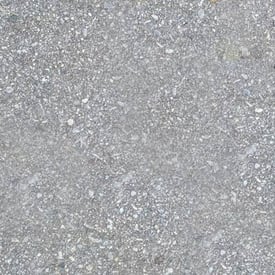 Asphalt is a versatile and widely used material that plays a crucial role in our daily lives. It's commonly found on roads, parking lots, and driveways. You might also hear it referred to as blacktop or tarmac.
Asphalt is a versatile and widely used material that plays a crucial role in our daily lives. It's commonly found on roads, parking lots, and driveways. You might also hear it referred to as blacktop or tarmac.
But why is asphalt so popular? For starters, it provides a smooth and safe surface for vehicles to travel on. It absorbs the impact of traffic, making the ride more comfortable and reducing wear and tear on vehicles.
Additionally, asphalt is resistant to various weather conditions, such as rain, snow, and extreme heat, which helps extend its lifespan.
One great advantage of asphalt is its ability to be recycled. When roads or parking lots reach the end of their lifespan, they can be milled and repurposed into new asphalt, reducing waste and conserving valuable resources.
Maintenance is also relatively easy with asphalt. Small cracks and potholes can be repaired quickly, ensuring a smoother and safer driving experience.
What is Asphalt Made of?
At its core, asphalt is a mixture of aggregates (like rocks, sand, and gravel) and a sticky, black, petroleum-based substance called bitumen. These ingredients are carefully blended to create a durable yet flexible material.
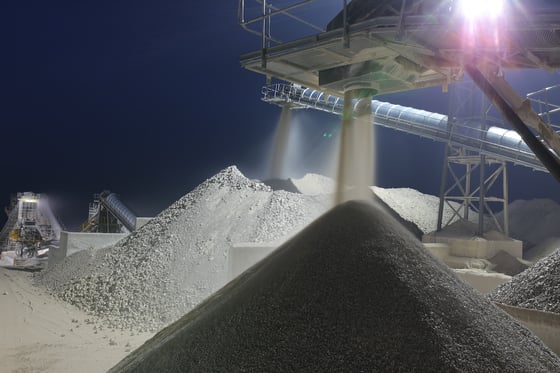 Photo by Soner Mazlum via Pexels
Photo by Soner Mazlum via Pexels
The first are aggregates. This is a mix of crushed stone, gravel, and sand. Aggregates make up about 95% of hot mix asphalt pavement.
The other ingredient is bitumen. Bitumen is a dark viscous material that holds the aggregates together and is composed of polycyclic hydrocarbons (a petroleum byproduct).
For a deeper understanding of asphalt's ingredients, the elemental components of asphalt include carbon, hydrogen, sulfur, oxygen, nitrogen, and trace amounts of iron, nickel, and vanadium.
There are several different types of asphalt, and they are categorized by the process used to bind aggregate with the bitumen.
Related: Asphalt Maintenance vs Lawn Maintenance: The Best Business for 2023
Common Asphalt Applications
Asphalt has a wide range of common applications in various industries and infrastructure projects. Some of the most common applications of asphalt include:
Road Construction. Asphalt is extensively used for building roads, highways, and freeways. Its durability, smooth surface, and ability to withstand heavy traffic make it an ideal choice for providing safe and reliable transportation routes.
Parking Lots and Driveways. Asphalt is widely used for constructing parking lots and driveways due to its ability to withstand the weight of vehicles and its smooth and comfortable driving surface. It's also aesthetically pleasing and boosts homes' curb appeal.
Airport Runways and Taxiways. Asphalt is commonly used in the construction of airport runways and taxiways due to its ability to handle heavy aircraft loads. It also provides a smooth landing surface and can withstand the impact of aircraft tires.
Bicycle and Pedestrian Paths. Asphalt is often used for constructing bicycle lanes and pedestrian paths, providing a smooth and durable surface for active transportation.
Racetracks. Asphalt is the preferred surface for racetracks, including professional racing circuits and local racecourses. Its smoothness and grip characteristics allow for high-speed driving and enhanced safety.
Roofing. Mastic asphalt is used as a roofing material, especially for flat or low-slope roofs. It provides excellent waterproofing and durability, making it suitable for commercial and residential buildings.
Bridge Decks. Asphalt overlays are often applied to bridge decks to protect the concrete or steel structures from weathering, provide a smooth driving surface, and improve skid resistance.
Tennis and Basketball Courts. Asphalt is commonly used as a surfacing material for tennis and basketball courts. Its smooth and resilient nature allows for better ball bounce and player movement.
Recreational Areas. Asphalt is used for various recreational areas, such as playgrounds, running tracks, and outdoor sports fields, due to its durability and ability to withstand heavy use.
Maintenance and Repair. Asphalt is frequently used for patching and repairing damaged sections of roads, parking lots, and other asphalt surfaces. It allows for efficient and cost-effective maintenance to extend the lifespan of existing asphalt pavements.
Related: Summer Job Alert: 5 Awesome Gigs for Teenage Boys!
Advantages of Using Asphalt to Build Driveways and Parking Lots
Durability
When installed properly, asphalt is a highly durable material that can withstand heavy traffic for many years and the weight of vehicles without easily cracking or deteriorating. It provides a long-lasting surface that can endure years of use.
Smooth and Comfortable Surface
Asphalt creates a smooth and even surface for vehicles to drive on. This enhances the driving experience by reducing bumps and vibrations, providing a more comfortable ride.
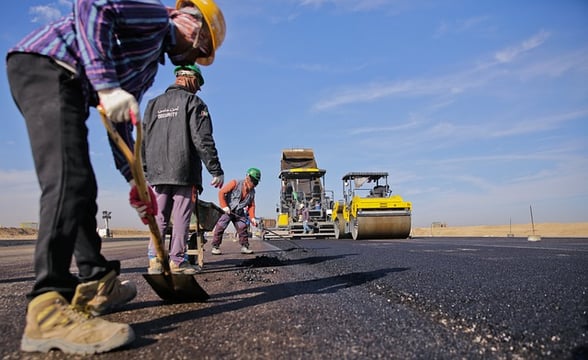 Image by s m anamul rezwan from Pixabay
Image by s m anamul rezwan from Pixabay
Quick Installation
Asphalt can be laid down relatively quickly compared to other materials like concrete. This means less disruption and inconvenience during construction, allowing you to start using your parking lot or driveway sooner.
Cost-Effective
Asphalt is often a cost-effective choice for parking lots and driveways. Its installation costs are typically lower than other options, and its durability means lower maintenance and repair expenses over time.
Safety
The dark color of asphalt helps melt ice and snow faster than other materials, making it safer during winter months. Additionally, asphalt offers good skid resistance, reducing the risk of accidents caused by slippery surfaces.
Flexibility
Asphalt is a flexible material that can adapt to slight ground movements and temperature fluctuations. This flexibility helps prevent cracking and damage, ensuring a longer lifespan for your parking lot or driveway.
Easy Maintenance
Routine maintenance of asphalt surfaces is relatively simple. Regular sealcoating and filling small cracks can help extend the life of the pavement and minimize the need for major repairs.
Asphalt: How it's Manufactured
Asphalt is made through a process called asphalt production or asphalt manufacturing. It involves carefully combining aggregates (such as crushed stone, gravel, and sand) with a binder called bitumen.
Here's a simplified overview of the steps involved in making asphalt.
High-quality aggregates are selected based on their size, shape, and composition to ensure the desired properties of the asphalt mixture. The aggregates are typically sourced from quarries and undergo testing to meet specific standards.
If the aggregates contain moisture, they are dried in a rotating drum dryer to remove the excess water. Heating elements within the drum raise the temperature to facilitate drying and prepare the aggregates for mixing.
The bitumen binder, typically obtained from crude oil refining, is heated in a separate container or heating system to reduce its viscosity. Heating the bitumen allows for easier mixing and coating of the aggregates.
Next, the heated aggregates and the warm bitumen are combined in an asphalt mixing plant. The plant can be a batch plant, where specific quantities of aggregates and bitumen are mixed together, or a continuous plant, where the materials are continuously fed and mixed.
Depending on the desired properties of the asphalt mixture, additives may be introduced during the mixing process. These additives include chemical compounds to enhance durability, flexibility, or other performance characteristics.
Throughout the mixing process, samples are taken and tested to ensure the asphalt mixture meets the required specifications and quality standards. Adjustments can be made if necessary to achieve the desired properties.
Once the asphalt mixture is thoroughly mixed, it is stored in heated storage silos to maintain its temperature until it is ready for transportation to the construction site.
Specialized trucks or transporters are used to deliver the hot asphalt mixture to the desired location.
At the construction site, the hot asphalt mixture is spread and compacted using heavy machinery, such as asphalt pavers and rollers. This process ensures proper compaction and smoothness of the asphalt surface.
The exact details of the asphalt production process can vary depending on factors such as the type of asphalt plant and the specific requirements of the project.
However, the basic principles of combining aggregates and bitumen to create a durable and reliable asphalt mixture remain consistent.
Related: The Impact of Weather on Asphalt (+ How to Protect Your Pavement)
Asphalt Types
Hot mix asphalt concrete
It is produced under high heat and is the most durable of the asphalt types. The production process of hot mix asphalt involves combining aggregates (such as crushed stone, gravel, and sand) with a binder called bitumen.
The aggregates are heated to remove moisture and then mixed with the bitumen, typically in a specialized plant called an asphalt mixing plant. It is generally used in high-traffic applications, such as on driveways, highways, parking lots, and airport runways.
Warm mix asphalt concrete
This type of asphalt does not require extremely high temperatures for manufacturing because of the addition of emulsions, waxes, and zeolites.
While it is safer for the environment and workers and uses less fossil fuels in its production, it does not offer the same level of durability as hot mix asphalt concrete. Thus, it is primarily used for low-traffic areas or for patching.
It's important to note that warm mix asphalt does not compromise the quality or performance of the pavement. It offers similar characteristics and durability to traditional hot mix asphalt while providing environmental and operational benefits.
Mastic
This is a specialized form of asphalt that is known for its high durability and waterproofing properties. It has less bitumen content than hot mix asphalt concrete and is commonly used for road construction and roofing.
Regardless of its type, all asphalt needs some maintenance to provide extra protection and durability.
Asphalt Quality Control and Testing
Quality control measures and testing procedures play crucial roles in maintaining the performance and longevity of asphalt pavements. They help achieve consistent mix design, comply with specifications, and ensure material quality.
They also predict pavement performance, prevent failures, ensure proper construction practices, and ultimately save costs over the lifespan of the pavement.
Asphalt Sustainability
Asphalt is one of the most sustainable materials used in the construction industry. In fact, it is one of the most recycled materials in the world.
Recycling old asphalt reduces the need for producing new materials, helping people conserve resources and minimize waste.
Energy-efficient technologies optimize production processes, lowering energy consumption, and greenhouse gas emissions.
Asphalt Durability
If you've ever been jarred by a crack in an asphalt road or parking lot eyesores, you know that the material doesn't last forever. The performance of asphalt can vary widely depending on a number of variables, including the presence of moisture, temperature fluctuations, volume of traffic, and exposure to certain chemicals. Even varying asphalt ingredients can determine its durability.
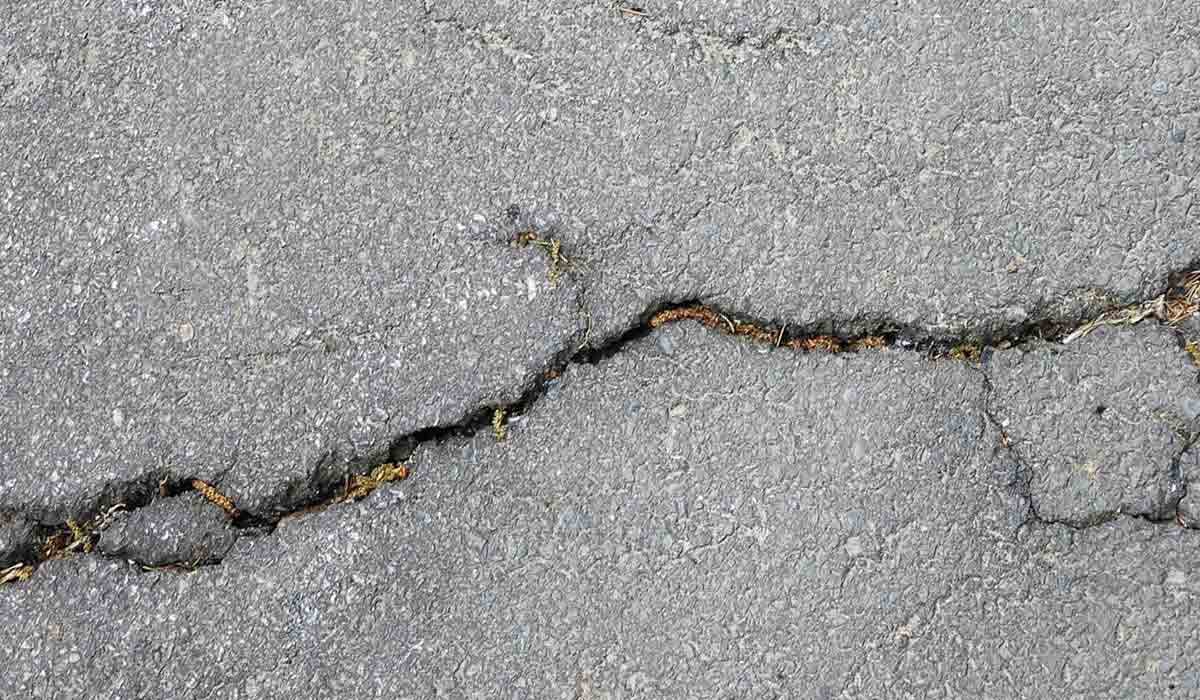
Because asphalt can hold the weight of vehicles, it is the material of choice for roads, parking lots, and driveways. It can be applied rapidly and can be patched easily.
But over time, asphalt ingredients can begin to erode and decay from heavy traffic, exposure to the elements, and expansion and contraction thanks to the freeze-thaw cycle.
Because of this, the use of a sealcoat is absolutely essential to the proper maintenance of any asphalt-paved surface. While there are a number of sealing products on the market, we only recommend the use of asphalt emulsion sealer because of its ability to create an effective buffer against traffic, water, oil salt, and other staining agents.
When asphalt ingredients aren't properly protected with a coat of sealer, they will inevitably crack. Leaving even small cracks and fissures exposed and unrepaired will definitely lead to more serious damage such as potholes, crumbling asphalt, and foundation damage. This ultimately results in the need for costly asphalt replacement.
What is the Most Effective Maintenance Strategy for Asphalt?
For homeowners, it's important to understand the ingredients in asphalt because it does need to be maintained on a regular schedule. An asphalt driveway can remain in good condition for decades if it is properly cared for.
Knowing what can negatively affect asphalt ingredients is also important. Since oil, grease, gas, salt, and transmission fluid can break down the quality of asphalt and ultimately result in cracking and crumbling, these substances should be cleaned up quickly if spilled on asphalt.
Frequent exposure to water can also damage asphalt in the long run. While covering pavement to prevent water from coming into contact with it is out of the question, there are things property owners can do to reduce or prevent damage.
Heavy loads, frequent exposure to the sun's UV rays, poor drainage, and temperature extremes can also speed up asphalt deterioration.
So what can property owners do to delay asphalt damage? Here are the options.
Crack Filling
As part of preventative maintenance, asphalt should be inspected for cracks. Even small, hairline fissures that go unrepaired or unfilled can cause the ingredients in asphalt to deteriorate.
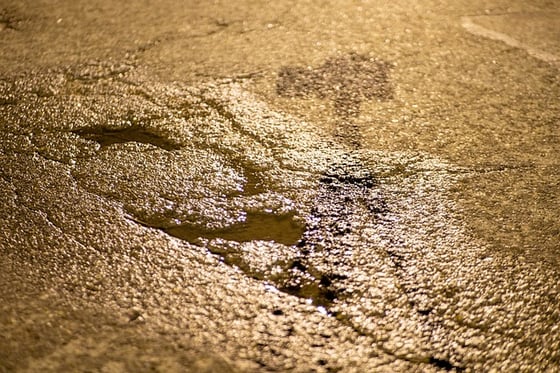 Image by computergottyt from Pixabay
Image by computergottyt from Pixabay
With all types of asphalt, a certain amount of cracking is inevitable. The secret is to fill the cracks before they expand and turn into potholes or larger areas of crumbling pavement. There are two types of crack filler that can be used on any asphalt or concrete surface.
Cold liquid pour asphalt crack fill is highly effective in sealing cracks up to ½” in width. The product is easy to use and keeps cracks on all types of asphalt sealed for several years.
Hot pour crackfill is a commercial-grade rubberized asphalt crack sealer that works on cracks up to 1” in width. It can be safely heated in a kettle or crack fill applicator melter and poured into cracks to seal out water, ice, and debris. It will keep cracks sealed for up to four years.
Sealcoating
All asphalt types require proactive maintenance and proper repair to retain their appearance and overall condition. Because of the nature of asphalt ingredients, driveways should be sealed every two to three years to prevent oxidation, loss of flexibility, cracking, and crumbling.
At Asphalt Kingdom, we recommend the use of asphalt emulsion sealer which protects the bitumen from oxidizing, becoming brittle, and cracking. It is easy to apply with either a spray system or a squeegee and dries quickly in three to four hours.
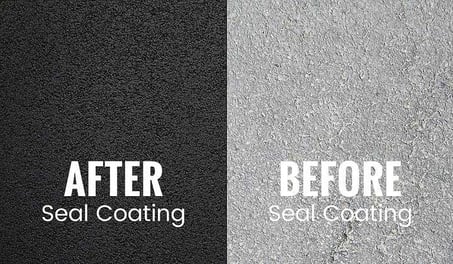
Whether you have a driveway or a parking lot for your business, sealcoating asphalt should be a priority.
Related: Your Handicap Parking Space Painting Questions Answered
Frequently Asked Questions About Asphalt
1. What is the difference between asphalt and blacktop?
The terms "asphalt" and "blacktop" are often used interchangeably. Both refer to the same material: a mixture of aggregates and a petroleum-based binder called bitumen. So, essentially, there is no difference between asphalt and blacktop — they are just different names for the same thing.
2. Is asphalt better than concrete?
Whether asphalt or concrete is better depends on various factors. Asphalt is more flexible and can withstand freeze-thaw cycles better, making it suitable for regions with colder climates. Blacktop pavements are also cheaper to install than concrete pavements.
Concrete, on the other hand, is known for its strength and durability. It's commonly used for heavy-duty applications like industrial areas or highways.
Ultimately, the choice between asphalt and concrete depends on specific project requirements, budget, and local conditions.
Want to learn more about concrete vs asphalt driveway cost and the pros and cons of using them? Then, check out this Asphalt Kingdom blog!
3. What are the benefits of driveway sealcoating?
Driveway sealcoating provides several benefits. It protects the asphalt surface from oxidation, UV rays, and water damage, extending its lifespan.
Sealcoating also enhances the appearance of the driveway by making it look fresh and well-maintained. Additionally, sealcoating fills in minor cracks, preventing them from expanding and developing into more significant issues.
4. What is the average asphalt driveway cost?
The paving cost per square foot of asphalt depends on various factors, such as the size of the driveway, location, local labor, and material costs. Property owners also need to consider how much excavation and land grading will be required.
On average, asphalt driveway installation can cost between $2 to $30 per square foot. But it's best to get a personalized quote from a reputable contractor for an accurate estimate.
Blacktop Driveway Cost
|
Depth |
Coverage per ton |
100 ft² Driveway Cost |
|
2 inches |
80 ft² |
$125 – $250 |
|
4 inches |
40 ft² |
$250 – $500 |
|
6 inches |
30 ft² |
$333 – $67 |
Asphalt cost per ft. depth
5. How many years does it take before an asphalt pavement needs to be repaved?
The lifespan of an asphalt pavement can vary depending on factors such as usage, climate, maintenance, and quality of initial installation.
On average, asphalt pavement can last around 15 to 20 years. However, proper maintenance (including sealcoating and crack filling) and timely repairs can significantly extend its lifespan.
6. Is sealcoating really worth the cost?
Sealcoating is worth it as it helps protect the asphalt surface from damage, extends its lifespan, and enhances its appearance.
It's a cost-effective preventive maintenance measure that can save money in the long run by avoiding more expensive repairs or premature replacement.
7. What can I use to fill asphalt cracks?
Asphalt cracks can be filled using a variety of products. Some common options include hot pour rubberized crack filler and liquid crack sealant.
It's important to choose a product specifically designed for asphalt cracks to ensure proper adhesion and durability.
8. What is pothole patching?
Pothole patching is the process of repairing potholes using hot mix asphalt or cold mix asphalt patch.
9. What is the best product to fill potholes?
The best product to fill potholes depends on the size and severity of the pothole, as well as the weather conditions.
Hot mix asphalt is commonly used for large potholes, while cold mix asphalt patch can be used for temporary or small repairs.
It's best to consult a professional or follow product guidelines for the most appropriate solution.
10. Why is parking lot striping important for asphalt maintenance?
Parking lot striping is important for asphalt maintenance as it provides clear and organized traffic patterns, defines parking spaces, and ensures safety for drivers and pedestrians. Properly striped parking lots also enhance the aesthetics of the area and comply with local regulations and accessibility standards.
11. What are the most common mistakes when maintaining asphalt driveways and parking lots?
The most common asphalt maintenance mistakes include neglecting regular sealcoating, failing to address cracks and potholes promptly, and improper drainage. Improper surface prep can also affect the results of asphalt maintenance.
It's important to stay proactive, perform regular inspections, and address maintenance needs promptly to avoid costly repairs or premature deterioration.
12. How often should property owners apply asphalt sealer?
The frequency of applying asphalt sealer can vary depending on factors such as climate, usage, and the condition of the pavement.
As a general guideline, it's recommended to apply asphalt sealer every 2 to 3 years. However, it's best to consult with a professional or follow the manufacturer's recommendations for your specific circumstances.
Free Asphalt Course
To learn how to maintain your asphalt, take Asphalt Kingdom's free AKPRO 4-day Email Asphalt Maintenance Course. With the course, you can learn everything you need to know to protect your asphalt investment.
FREE COURSE!

HOW TO START YOUR OWN ASPHALT BUSINESS
Sign up for our free Create Your Own Asphalt Business Course
You will get instant access to all the days in the guide when you confirm your email address.






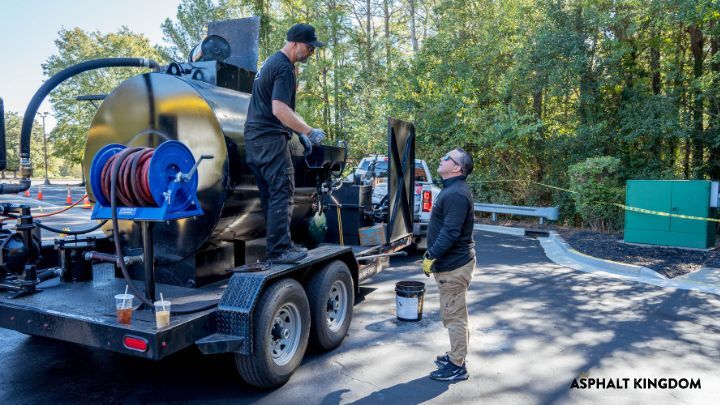
-2.jpg)
-1.jpg)